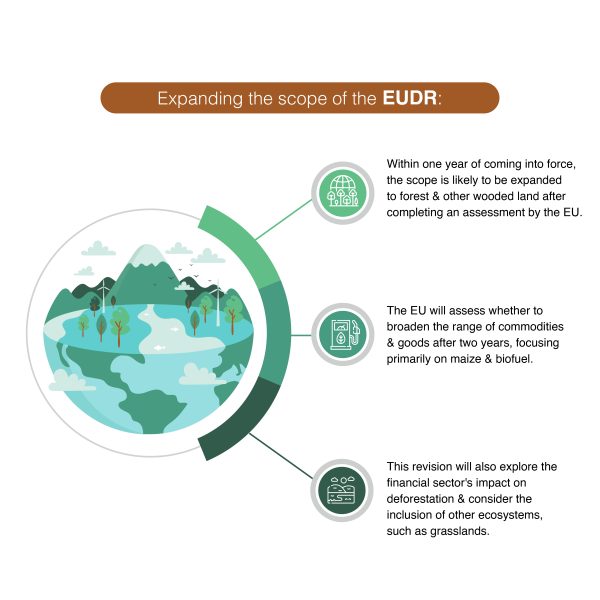
Future changes and evaluations of the EUDR:
The European Union Deforestation Regulation (EUDR) has emerged as a vital tool in combating deforestation and encouraging companies to adopt sustainability in global supply chains. The EUDR is not static; it is intended to change in response to new situations and difficulties. Here are the EUDR’s anticipated modifications and evaluations in the future, including any potential scope increases.

Evaluation of effectiveness and impact:
- After five years, there will be a comprehensive evaluation of the EUDR’s effectiveness in achieving its goals. This assessment will consider its impact on stakeholders, including smallholders and local communities.
- The evaluation will explore whether additional trade facilitation tools and support are needed, particularly for Least Developed Countries (LDCs), to help them comply with the EUDR and benefit from sustainable practices.
- The results of this evaluation will shape future amendments and improvements to the regulation, ensuring that it remains an effective tool against deforestation.
The importance of considering human rights and community rights in due diligence processes:
Emphasising the significance of considering human rights and community rights in due diligence processes is essential for the EUDR and broader sustainability efforts. Protecting these rights is part of ethical business practices and vital to fulfilling sustainable and responsible business practices.
Upholding ethical and legal responsibilities while mitigating risks
EUDR ensures the protection of indigenous people and local communities since respecting human rights is an essential part of the regulation. Numerous national legal systems and international agreements safeguard these rights. Ignoring them may have legal ramifications and harm your reputation. Suppose you fail to consider human and community rights in due diligence processes. In that case, you will expose your business to significant risks. For instance, engaging in activities that violate these rights can lead to legal disputes, fines, and regulatory sanctions.
Fostering sustainability, meeting regulations, demonstrating responsibility
Sustainable business practices are inherently connected to human rights and community rights, with indigenous people and local communities often serving as crucial stewards of natural resources. Their participation can enhance the long-term well-being and sustainability of ecosystems. By respecting these rights, companies can establish mutually advantageous partnerships with communities, promoting collaborative efforts to achieve sustainable development goals.
Businesses must incorporate human rights and community rights into their due diligence procedures when complying with the EUDR. Failing to adhere to these standards can lead to legal fines and limitations on market access. Actively integrating these factors into due diligence processes ensures compliance with regulatory mandates.
Responsible businesses face increasing expectations to demonstrate their human and community rights commitment. This includes transparent reporting on efforts to respect and protect these rights and addressing any violations. Such practices can captivate socially conscious consumers and investors, setting companies apart in competitive markets.
Conclusion
By integrating traceability into due diligence processes, companies can demonstrate corporate responsibility, meet legal obligations, and capture the attention of conscientious consumers and investors. RightOrigins is your partner in achieving these goals, paving the way for responsible, sustainable, and transparent business practices.
Our Supply Chain Traceability & ESG Intelligence suite helps companies meet regulatory requirements, ensure ethical practices, and maintain sustainability in today’s fast-changing business world. Our platform provides comprehensive traceability down to the polygon level, allowing businesses to prove their commitment to ESG principles and compliance with the evolving European Union Deforestation Regulation (EUDR).
